7-13-18
Xavier Legrand’s Custody: What’s Love Got to Do with It?
By Diane Sippl
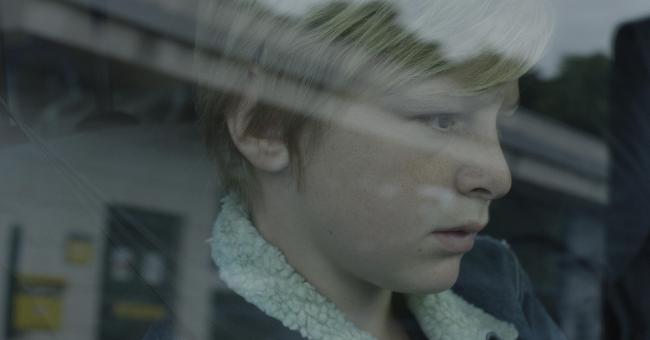
“He’d always look down in sadness,” she said of her son’s response to her abuse. “One day when Ike was fighting me, Craig knocked on the door and said, ‘Mother, are you all right?’ I thought, ‘Oh, please, don’t beat me at home.’ I didn’t want my children to hear.”
Tina Turner, People Magazine
It shows a very particular way to look at love, which is, I prefer you dead than without me.
Xavier Legrand, Writer-Director of Custody
On April 17, 2018, just a week before the new film, Custody premiered at COLCOA French Film Festival in Los Angeles, the new stage musical, Tina, opened at the Aldwych Theatre in London. On July 3, 2018, just ten days before Custody opened theatrically in Los Angeles, local resident Craig Turner, the oldest son of Tina Turner, born when she was 18 and subsequently adopted by her husband and business partner Ike Turner, took his own life at age 59.
Custody may embody the hyper-realism of Maurice Pialat’s domestic dramas, the intrigue and social commentary of Claude Chabrol’s mysteries, and the psychological acuity of Alfred Hitchcock's films, but that its story comes from headlines today, half a century after these masters showed us the fear and violence within families, is as lamentable as Xavier Legrand’s work is laudable. Legrand (doubly awarded at the 2017 Venice Film Festival with the Silver Lion for Best Director and the Lion of the Future for Best First Feature Film) based Custody on his first short film (also a prize-winning drama), Just Before Losing Everything. While Denis Ménochet and Léa Drucker reprise their roles as husband and wife battling for custody after their divorce and newcomer Thomas Gioria impeccably delivers the terror and trauma of their 11-year-old son, one character shies into the background as much as she can—a teenage daughter who is seeking an escape from the dangers her father presents.
In a film displaying the deliberate choice to omit a music score, a key scene with this daughter amazes us when she sings on stage for her guests, accompanied by her guitarist boyfriend, in celebrating her 18th birthday. Her attraction to and relationship with this boy has been, up to now, unclear. As she takes up the limelight, her father looming in the darkness outside the auditorium dance floor where the party is held, her face shows the repertory of emotions her father elicits in her: worry, stress, anxiety, fear, uncertainty, alarm. Seemingly out of nowhere, she captures our attention by performing “Proud Mary.” It’s a slow burn of a song that she quietly murmurs, and while it may have been recorded first in 1968 by Credence Clearwater Revival, its 1970 cover by Ike and Tina Turner is a classic that led to the subsequent song and 1983 biopic, What’s Love Got to Do with It? in which Tina Turner’s frightening life story is convincingly portrayed by actress and activist Angela Bassett. As Custody’s Mathilde Auneveux, who plays Joséphine, collects her strength on stage and belts out the second, sure-fire half of “Proud Mary,” her frenzy wins applause from her friends and terror from us, because she then flees “for her life” and that of the baby in her womb to another town with her boyfriend where she can deliver and raise her first child in safety. The scene sends a shiver through the audience, but this one moment of music tells it all. Everything Joséphine could have imagined then transpires before our eyes.
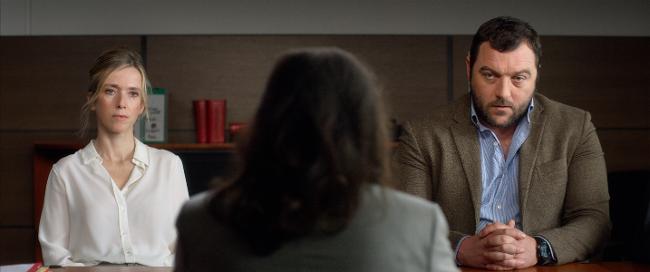
This is not an action film; its scenes are jolting because they are all too familiar, and Legrand lets us feel them coming. Custody is a sobering cautionary tale of systemic ills. The “Proud Mary” band performance is an utter surprise, in both the narrative and the tone of the film. On the one hand this sudden musical touch is a heart-warming turn in the story, a lyrical break and pause in the accelerating thriller mode, but at the same time it’s played for tension within the momentum of the film as the editing cross-cuts between Joséphine's singing and her mother’s interaction with her father in the parking lot.
The violence is brewing, and what’s “refreshing” in an ironic way is to see the mother’s sister confront this all-possessive husband, both verbally and physically, and urge her sister to file a report. Custody shows us not one instance of sexual titillation on the part of the woman (a ploy often used in lesser films to sustain audience attention in the most conventional, sordid way). Instead it shows us others stepping up to protect this woman—a new male acquaintance, a neighbor, even her son. The film’s sad realism shows that not only the violence but even the marital discord takes a terrorizing toll on the young son, and furthermore, that laws, even when enacted to resolve social injustice and domestic abuse, still are subject to interpretation (by the courts) and enforcement (by the police).
As we left the theater at COLCOA’s premiere of Custody, (quite shaken, I might add), I asked Xavier Legrand, “Is it difficult to get a restraining order in France today, so as to block this violence early on?”
He was most forthcoming with his reply: “Yes, very difficult. You have to be in a situation of very serious, acute danger and to prove it with clear, tangible evidence.”
I continued, “Is fear the reason women don’t file complaints against abusive men?”
And he explained, “Yes, and when they do file official complaints with the police, nine out of ten women withdraw their complaints due to threats from the men.”
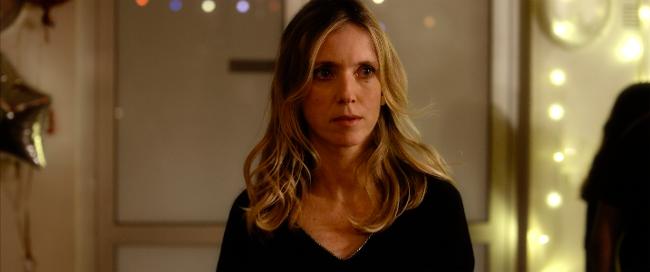
What follows are excerpts from Xavier Legrand’s responses in a post-screening Q&A at COLCOA:
“I chose to make my film on this subject because it is a tragedy in my country. There’s a woman who is killed every other day by her husband, and for myself, as a man, I feel concerned, and I think, as a man, we have to speak up against domestic violence.
It’s not that I have anything against men; I hate the construction of patriarchy. There’s nothing personal in this story. But on the other hand, I was raised in a patriarchal type of family for many generations back. I did not live through any violence such as what I portrayed in the film, but I did live in the type of organization in which men and women each have their different places.
When we see the husband’s parents we can understand that he himself comes from a family that was very patriarchal, so he seems like the head of his family, the boss. His wife belongs to him. She’s his, and it’s his children. And from the moment she decides to leave him, he cannot bear that decision, that separation.
In order to create the character, I actually attended some group therapy sessions for violent men, and they are all people in denial of their own violence. I studied it a lot in those groups and I also read stories in the news of this type of character, and they always started to “lose it” and to act this way before or after the separation. It shows a very particular way to look at love, which is, “I prefer you dead than without me. We were married with the vow ‘to live together ‘til death do us part’, so you will die rather than leave me, and you will not be the one to decide that.” This type of man in my country is acting out the scenario of my film every other day, and in Mexico, such violence happens six times a day.”
Xavier Legrand was asked about his extraordinary ability to let a moment play for as long as it needs the character to play it, whether it’s lighting a cigarette or stopping the car and parking it, to have enormous confidence in each moment so as not to rush the actors or rush the audience, not to cut the camera.
He responded, “My first choice was to use real time, long-duration shots. I think that we can get more involved, more inside the character, when we live the moment in real time. The challenge of the film was to show situations that seem very ordinary, yet to create the anxiety that lets us feel that maybe something lies behind them.
Within that real time, I decided to use no music but on the other hand, to favor the sounds of life, like the click of the seatbelt, the ticking of the clock, the click of the door that locks—all these sounds become very loaded. In making films I want to embody all these feelings, to let the spectators really live inside all these feelings, and not just to have them in their heads.”
The film opens with the sounds of an institutional corridor as we enter the court building, but then the cut is to a silent room, at once creating a sense of dislocation and tension all the while that we become acutely aware of sound.
“Yes, when sound is amplified and suddenly it stops, the film tells the spectator, ‘Open your ears; something is about to happen. You should pay attention.’
Also, this idea of not adding any music and using all the sounds of life came from a personal story a woman told me; as she spoke, I felt I was listening to a thriller. She told me, ‘In fact, in the evening when he was coming back home, by the sound of the key in the keyhole, I knew whether that night he was going to beat me up.’ And I understood that sometimes the sound of a key can be stronger than the sound of an orchestra.”
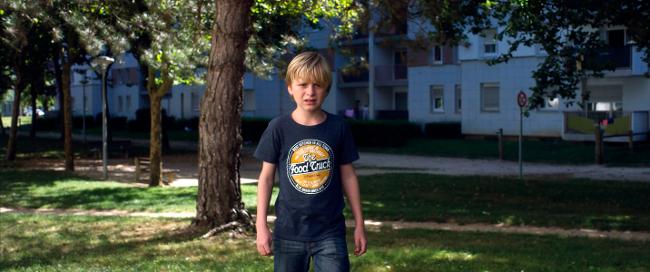
Legrand then spoke about working with Thomas Gioria, who plays Julien, the son. “After a long period of preparation, I approached him in very much the same way that I worked with the adults. And this method, since I’m an actor, is the same one I use when I work with myself.
A long time before the actual shooting, I provide for the actors lots of material, research material—articles to study, interviews. And then I take them one by one, and we read into the psychology of the character, sometimes even the psychiatry, and during this preparation we work on the dialogues of that character, and then once this is done, on the shoot, we don’t talk about that any more. It’s done. After that, I direct the actors only in terms of physical action—go a little faster, a little slower, give some importance here—it’s a bit like a musical composition. I think it creates a way to go from scene to scene in which the actor no longer thinks about the psychology but is just into the action.
It’s also important to keep a bit of distance. Actually, the way I like to work is that on the shoot, I like things to be relaxed, even pleasant, fun, so that when we get to the actual filming of the scene, we can bring focus and attention.
Another thing is that for the scenes that are very strong, that need to be very powerful, I actually play the soundtrack for the actors, to put them in the situation. For the party scene, I played the music that we hear in the film, and for the bath tub scene, we played the shotgun sounds very, very loud, and the screaming, and all the sounds of that scene, which we had recorded earlier.”
When asked about his writing process, the filmmaker responded, “I did follow a real Family Judge for about a week, and she was going through a ton of files every day, and I stayed with her process during this time and listened to all these cases, but I didn’t record them. I was not allowed to do this in court.
I spent a very long time gathering all kinds of material on the subject, and from all the information I started to construct the story line, which was difficult because it was very loaded. Once I had the story line and all the scenes—because I had a lot of them that are not even in the final film—then, as we say in French, I did a whole job of ‘skimming the fat’ to go down to the bone.”
Legrand said that he didn’t edit the film himself. “But,” he explained, “it is edited the way it was written. Yet at the same time, it’s a matter of instinct and rhythm, and I feel that very strongly, and I feel when it’s time to move to another shot, and so on.
It’s an ongoing battle with the production designer and the costume designer and the D.P.—each who would like to bring a little bit more to the scene—in order to keep it simple and realistic. For example, an interesting case is the last scene, in the bath tub. It’s true that when you normally see such a scene at night in a film, there is some light, like the moonlight that appears through a window, that allows you to see at least a silhouette of a face or something. But I said, ‘No, this scene is happening in the dark. She’s lying down in the bath tub and you see nothing, and that allows you to open your ears.’ But for the visuals, we had to find a solution. And I said, ‘When we are in the dark, there is a moment when we slowly get used to it. We start to perceive a little something, since in the dark our pupils dilate.’ My D. P. came up with a very clever solution, which was, as this long scene went on, to slowly open the aperture.”
When asked whether he thinks his film can change something about the judicial process in France, he replied, “I don’t know. I hope so. Yet I am very happy because next month there is a special screening in Paris in front of the whole group of lawyers and judges and other people and they’re going to watch the film.”
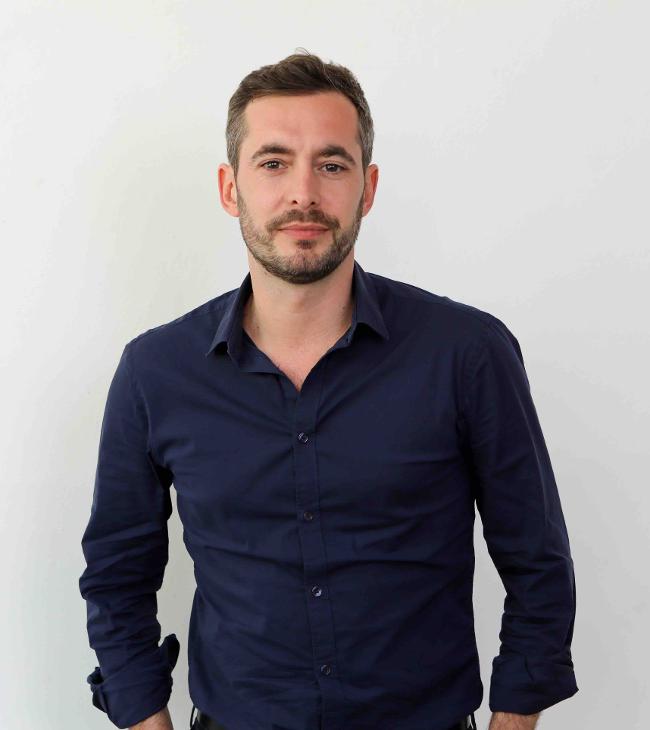
Writer-Director Xavier Legrand
Custody
Director: Xavier Legrand; Producer: Alexandre Gavras; Screenplay: Xavier Legrand; Cinematographer: Natalie Durand; Editor: Yorgos Lamprinos; Designer: Jérémie Sfez; Sound: Julien Sicart, Vincent Verdoux, Julien Roig; Costumes: Laurence Forgue-Lockhart.
Cast: Denis Ménochet, Léa Drucker, Thoma Gioria, Mathilde Auneveux, Mathieu Saïkaly, Florence Janas, Saadia Bentaïeb, Sophie Pincemaille, Émilie Incerti-Formentini.
Color, 90 min., in French with English subtitles.